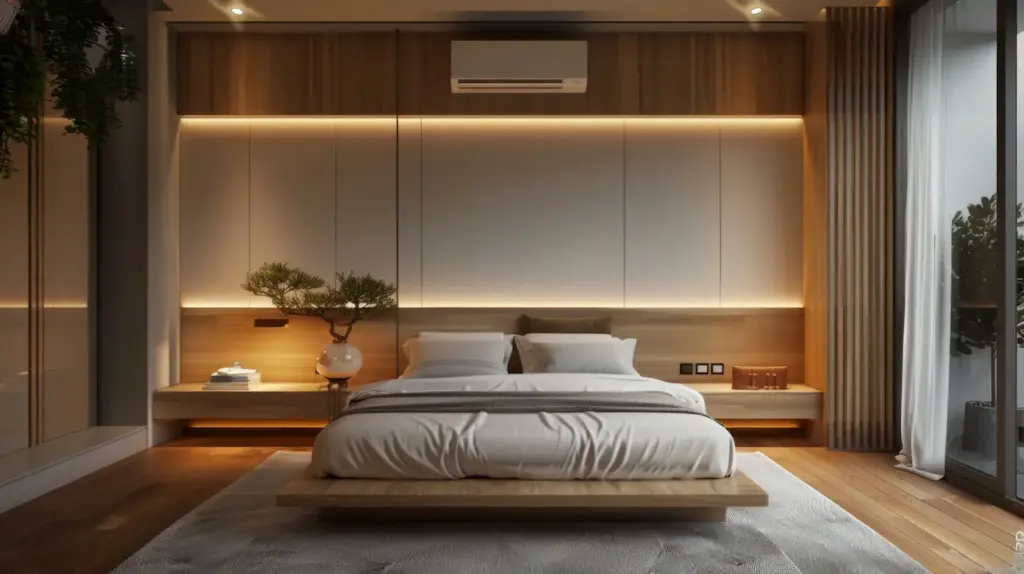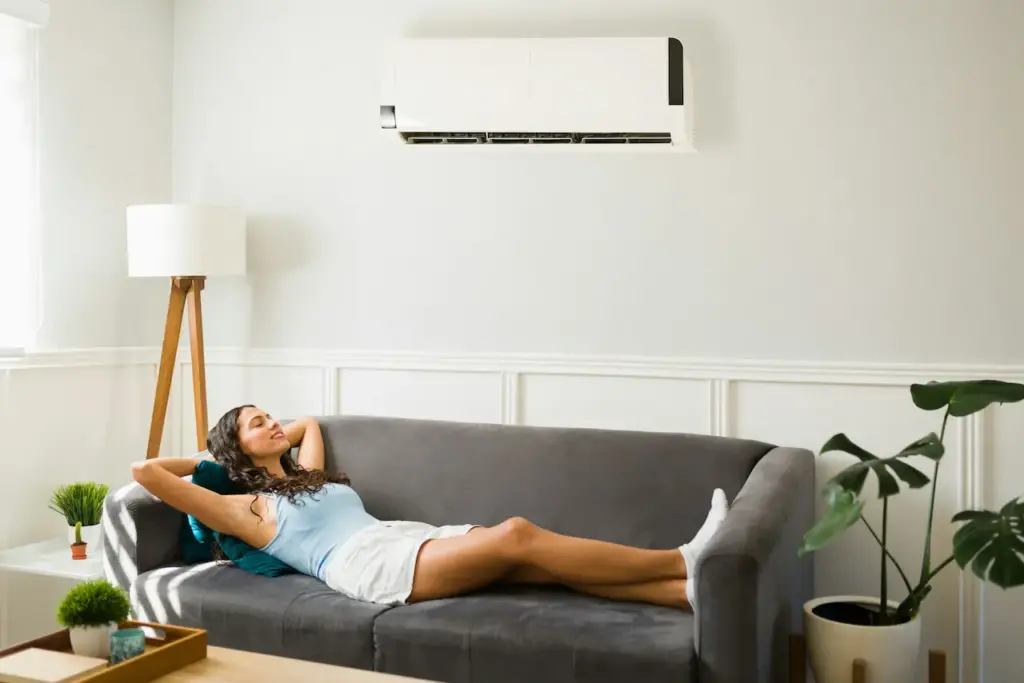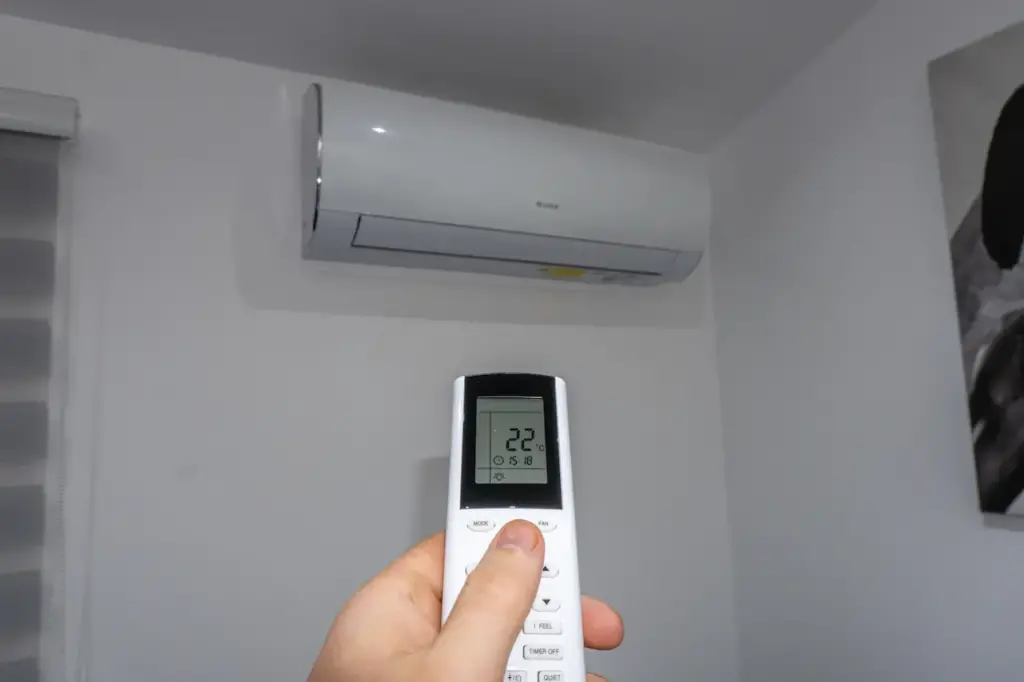Best AC Temperature to Sleep
Best AC Temperature to Sleep: According to Science
The answer to this question is not one size fits all. The ideal sleeping temperature can differ depending on the individual. Science does offer some advice on how temperature affects sleep and the ideal sleeping environment.
Also, we discuss the pros and cons of sleeping with AC on. We also offer some tips to create the perfect sleep environment.

What is the Importance of Temperature for Sleep?
The temperature of your environment and the quality of your sleep are closely related. The body regulates its temperature internally throughout the day, also called the circadian rhythm. The internal body temperature is at its highest around noon and begins to drop when you go to bed. It continues to fall until morning. When sleeping, the body temperature can fall by as much as 2 degrees (the normal body temperature is 98.6 F).
During the REM stage, the brain does not regulate the body’s temperature. Instead, it leaves the job to the environment (or bedroom temperature). If your room is hot or fluctuates in temperature during the REM stage, your sleep will be affected. Many people have trouble sleeping in summer because their body temperature does not drop enough at night. They wake up hot and sweaty.
To ensure a good night’s sleep, you should keep the temperature of your bedroom at a reasonable level.
What is the Best AC Temperature to Sleep At?
Sleep experts and numerous studies agree that the ideal AC sleeping temperature should be 60-67 F or 15.5-19.4 C. This temperature range is generally conducive to better REM sleep stability. According to Dr Ritesh, for babies and toddlers, the ideal AC temperature range should be 70-75F because they are unable to regulate their body temperature like adults.
It’s important to remember that while the ideal temperature for sleeping is usually cooler, everyone is different. You should experiment with the temperature to see what works for you. The difference between four and five degrees isn’t going to make a big impact on the quality of your sleep.
I prefer to keep my AC between 70 and 75 F, as do many of the people I know. While science may be correct, it is important to find out what works for you.
Sleeping with AC can have its downsides. Here’s how to deal with them.
You now know the ideal temperature for sleeping with AC. Let’s look at the downsides you may encounter.
1) Windy Worries
A study by the Toyohashi University of Technology, Japan, reveals that airflow directed at your body at high speeds can increase your heartbeat and change sleeping positions. The scientists used electroencephalograms (EEGs) and individual reports to determine that 0.14 m/s (the speed of most AC systems) can increase heart rate, and cause a higher frequency of waking up compared to 0.04m/s. Participants felt cooler when the airflow was higher during sleep and wakefulness. The study also showed that AC can stimulate the body, even when the airflow velocity is barely noticeable. This suggests that the subjects could be unknowingly experiencing negative effects on sleep despite their subjective reports of satisfaction.

2) Cold Fears
The same study found that cold airflow can negatively affect sleep, particularly for people with lower physical strength and greater cold sensitivity. It’s important to remember this if you are sick or sensitive to cold.
Scientists at Tohoku Fukushi University have found that the sensation alone can be detrimental. Therefore, some scientists suggest keeping bedrooms warm while sleeping by World Health Organization Guidelines.
3) Dryness
Anyone who has spent time in the cold air knows that it can cause a drying reaction. You could end up with chapped lips or dry skin. But the dangers don’t stop there. When there is a bit of moisture in your air, it makes breathing easier. But when this moisture is taken away, you may feel congested, or worse, sore, in the morning. We recommend using a humidifier to counteract the risks. Also, a skincare regimen that is rich in hydration will help.
4) Electricity prices
It’s hard to avoid this one. If you are concerned about the cost of maintaining the AC, we suggest that you only use it on nights when it is needed. Experts estimate that changing your dirty air conditioner filters regularly can reduce energy consumption by up to 15%.
5) Bacteria Buildup
The AC system naturally collects all the bacteria in the room because they process so much air. It is important to regularly clean your filters. It is recommended that you clean your filters 3 to 4 times a year or at the start of each new season. Experts recommend cleaning your windows every month during the summer and winter months when dirt and bacteria can build up.
Take into consideration your living situation. Cleaning is more frequent in places with pets, excessive dust, or plants.
The Benefits of Sleeping With AC
There may appear to be more cons when using an AC, but this is not true. These are a few benefits of using AC at night:
1) Counteract Hot Nights
The science behind why we can’t sleep in heat or cold is fascinating. Every night, our bodies go through different stages of sleep. One of these sleep stages is REM. This is important for memory and body restoration. To save energy, the brain ceases to send signals that regulate our body’s temperature. We become more dependent on our environment to maintain a healthy temperature. It must be a survival technique to wake up when it is hot or cold so we can set the temperature of our environment before going to bed.
Australians are well aware of how hot and humid it can be, particularly in the south and along the coast, where heat and humidity can make sleeping uncomfortable. Anyone who has tried to sleep while sweating through their socks knows how difficult it can be. Science Daily confirms air conditioning is a great way to sleep through the hot summer nights.

2) White Noise
The humming of most air conditioners can be quite soothing. This humming sound can act as White Noise and help people to fall asleep or stay asleep. Try playing white noise YouTube sounds as you sleep. ).
How to use AC Safely?
Sleeping Cool Without AC
Here are some tips to help you quit air conditioning and still enjoy a comfortable night’s sleep.
- Get rid of your memory foam or foam mattresses. Instead, opt for innerspring mattresses.
- Choose bedding that is breathable, such as bamboo sheets.
- Before bedtime, bathe
- Avoid heavy blankets and quilts
- Avoid exercising before going to bed.
The Bottom Line
We seem to thrive best at 60-67 F and minimal wind. But again, this is all up to YOU! We recommend that if you are having trouble deciding on the temperature of your room, you keep a record of how you felt each night. This information is intended to be helpful. We hope you feel more informed about how to sleep.




